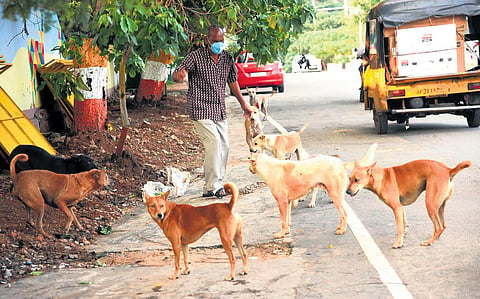

VIJAYAWADA: The recent death of a child on April 6 due to a stray dog attack has sparked widespread public outrage and highlighted the growing concern over the State’s stray dog population. Following the incident, Chief Minister N Chandrababu Naidu ordered a review of the situation and demanded swift action. However, animal welfare activists and experts argue that the steps taken so far have been inadequate, with some claiming that the government’s actions have stirred unnecessary panic.
Data from the Integrated Health Information Platform (IHIP) reveals that 7,05,555 dog bite cases have been reported across the State since 2022. Despite this alarming number, there are major discrepancies between the figures provided by municipal officials and the findings of the 2019 Animal Enumeration, which recorded a total of 4.71 lakh stray dogs—significantly higher than the 3.43 lakh claimed by officials. This inconsistency has raised questions about the accuracy and reliability of the reported figures.
As of now, only 68,192 stray dogs have been sterilised under the Animal Birth Control (ABC) programme, which aims to reduce the stray dog population. Activists argue that the programme is ineffective, with a disproportionate number of male dogs being sterilised while female sterilisations, which have a more significant impact on controlling the population, are being neglected. Tejovanth Anupoju, founder secretary of the ‘Help for Animals Society,’ criticised the approach, stating, “Sterilising ten males and skipping one female defeats the programme’s purpose.”
Veterinary doctors have acknowledged that sterilising female dogs requires more time and expertise, and weak monitoring of contractors has allowed inflated numbers to be reported while fewer surgeries are actually being performed. The closure of sterilisation centres, such as one in Guntur, has only exacerbated the issue. The Animal Welfare Board of India (AWBI) found serious lapses in these centres, including mismatched sterilisation records and poor coordination with the Animal Husbandry department, as outlined in the ABC Rules of 2023.
Activists have also pointed out that the unregulated breeding of dogs and the lack of proper control over pet shops have contributed to the crisis.
Abandoned or unsold dogs are often dumped, further increasing the stray dog population. Experts are calling on the State Animal Welfare Board to implement standard operating procedures (SOPs) to regulate breeding and pet shops to prevent unvaccinated and unsterilised animals from entering public spaces. Experts also warn against the removal of dogs without sterilisation, as this can lead to new, often more aggressive animals moving into the area. Studies have shown that sterilised dogs are generally more stable, and the key to resolving the issue lies in effective ABC programmes, vaccinations, public awareness, and responsible pet ownership.
In response, Principal Secretary Suresh Kumar clarified that the figure of 3.4 lakh stray dogs applies to urban areas and assured that action is being taken to address the issue.
He confirmed that ABC and ARV programmes will be implemented. The Chief Minister has also instructed the appointment of Veterinary Assistant Surgeons (VAS) and Assistant Directors (ADs) to fast-track these efforts.